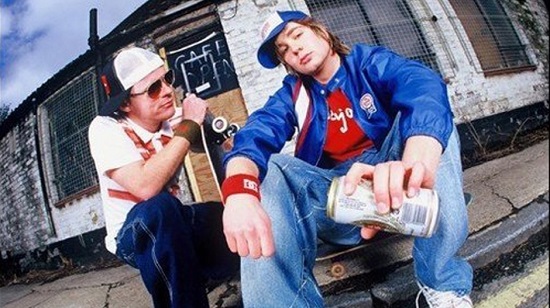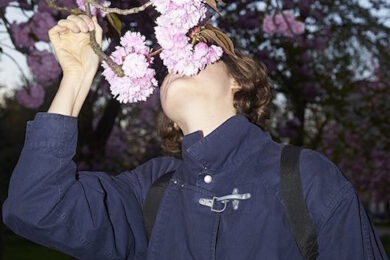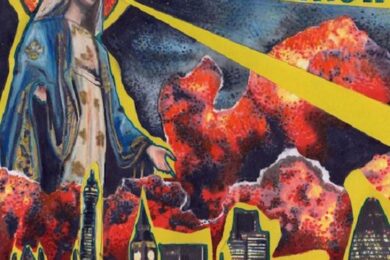There’s an oft-repeated, possibly apocryphal, tale concerning Charlie Chaplin and his decision to enter a Charlie Chaplin lookalike contest, only to suffer the indignity of coming third. This apparently occurred at some point in the 1920s; surely, in the hyper-connected, media-savvy noughties, such slippery deception is unthinkable? Seemingly not. Especially when the story concerns two wily but unsuccessful rappers from Dundee (derided as ‘the rapping Proclaimers’), who resorted to re-inventing themselves as a brazen, obnoxious hip-hop duo from California as a last gasp attempt to find themselves a record deal. Incredibly, it worked: Gavin Bain and Billy Boyd dispensed with their Scottish heritage to become Silibil n’ Brains and embraced a completely fabricated world of ultra-brash, American-accented hip-hop, keeping up the lie for a staggering four and a half years before disbanding in a hail of acrimony and unfulfilled dreams.
Documentary maker and artist Jeanie Finlay – already an expert in charting the underdog mentality from her remarkable Sound It Out, which detailed the plight of an independent record store in her native Teesside – brings the story of Silibil n’ Brains to light in The Great Hip Hop Hoax, a startling saga of falsehoods, friendship and near-fatal ego tripping. "I would say this has been quite a difficult film for me to make," reflects Finlay. "In my last film [Sound It Out], I had a really warm relationship with the people who took part. But The Great Hip Hop Hoax had quite a difficult birth. What’s important when making a film is to reflect how you feel, and I was never that interested in the music, I was interested in the lie and the fact that they created characters. But it was also interesting for me to make a film about people I found it difficult to like at times. Hopefully the audience feel some empathy towards them or their feelings towards them change throughout the film."
Finlay intersperses interviews and clever animations courtesy of Jon Burgerman with abundant archive footage shot by Boyd and Bain themselves, as we witness the duo arriving in London to sign a record deal and hurling themselves into a wide-eyed, slack jawed lifestyle of excessive rock & roll behaviour, including one memorable-for-all-the-wrong-reasons moment where Boyd pisses into Bain’s cupped hands for him to drink from. "People like the idea of the underdog, of sticking their fingers up at the establishment," Finlay says. "But what’s troubling for me is that everyone [nowadays] sees fame as a birthright, an ambition to have. And maybe that isn’t the healthiest thing for everyone. Silibil n’ Brains have reformed and have put an album and are releasing it off the back of the film. I wish them well but…I’ve created a monster!"
The dark heart of the film lies in the relationship between Gavin and Billy. Initially inseparable, the lure of stardom had very different effects on the duo and ultimately scuppered both their music and their friendship. Billy returned to Scotland to raise a family in Arbroath while Gavin stayed in London, penning a book on their story and desperately clinging to his dreams. "I had read about their story in the paper and three days later, I was sat with Gavin in London, listening to his story," she elaborates. "He was quite clear that he had a plan for the next five, ten, fifteen years and that I was part of that plan! He imagined he was going to have a documentary about him, a book and that there was going to be a feature film. And then the book came out, which was a very fictionalised version of events. I had to have Billy’s side of the story too, that was the only way it would work – it had to be the story of two men’s relationship held together by a lie.
"Billy was much more cautious, he had a lot more personally to lose," she continues. "At this stage, Gavin had told his story to the newspapers and to magazines like Loaded. And Gavin was passing off things that Billy had done as his own! I saw pictures in articles which said ‘Gavin Bain at the Brits’ when clearly it’s Billy. Gavin doesn’t let the truth get in the way of a good story. His book paints Billy as young, dumb and full of cum. It paints him as an idiot when he’s not. He’s incredibly charismatic but he’s very straight, there are no hidden agendas. When I first met Billy, I was a bit cynical about his new life. He’s got ‘Family First’ tattooed across his chest. It reminded me of the last scene in Goodfellas, when you’ve got Henry Hill collecting the paper and all you can hear are gunshots. He couldn’t put his crazy life to bed forever. But then as I got to know him I realised that his family is really, really important to him. Earlier this year, he turned down a big music festival because he’d booked a family holiday."
The mental stresses of living a lie for almost five years took a frightening toll on the duo. While on the one hand they were sharing stages with Eminem and D12, their boozing and conceitedness began to scale grotesque heights. "They thought they were so clever pulling a fast one, but if they just stopped messing around they might have done okay", Finlay says. "They were naïve. It’s not a logical reaction to being turned down. If you were turned down by a record company would you go, ‘[Being] Irish isn’t working out for me, I’m going to become British?’"
No, I wouldn’t.
"Exactly! It’s not logic at play here, it’s like listening to my nine year old and her mates playing games."
The documentary hits the screens in September, but to Finlay’s dismay it has been hit with an 18 certificate, primarily due to the aforementioned pissing exploits. "The BBFC have a questionable attitude to public urination," Finlay observes. "You can do it if it’s an Adam Sandler film and you can do it if it’s Nicole Kidman in The Paperboy, as long as it’s fake. Once it becomes real, it gets an 18 certificate. Part of me thinks, will it prevent an audience from seeing it? But it’s been shown in lots of youth festivals, it won the Youth Jury award in Vancouver. I did a special screening in Edinburgh for a group of 14 year olds, but now that would be illegal! I don’t think the BBFC have a sense of humour. Maybe I should blur it out, but it’s in the film because it’s an important part of the story, because their behaviour was ridiculous. I’m not condoning their behaviour, it was stupid. We need to see the light and the shade, really."
Along with promoting The Great Hip Hop Hoax, Finlay has programmed five of her favourite films to play at Nottingham’s Broadway Cinema in September to tie in with the release. I ask her for her thoughts behind the selections.
Black Narcissus (Michael Powell, Emeric Pressburger, 1947)
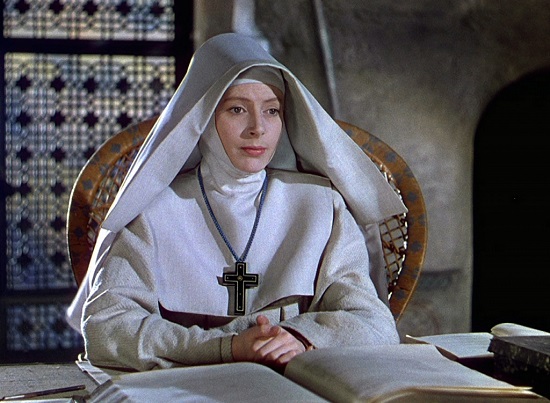
"I originally came to Nottingham to go to university. Five years later, I met this guy, Steven, who asked me to go see this film with him. It’s just the idea of how Pressburger created a whole world on a stage in a studio in England. It’s got everything: repressed passion, post-war austerity… it’s an amazing film. And I ended up marrying Steven as well!"
Pretty In Pink (Howard Deutch, 1986)
"Being a teenager, growing up in Teesside with red hair and then seeing Molly Ringwald, I realised the world is so big. She looked so cool! The exotic-ness of American high school movies [made me realise that] I can be different and that’s okay. (Pretty In Pink writer) John Hughes’ films spoke to a generation and came out at just at the right time. There was a whole group of people in Middlesbrough who thought my name was Molly! I was a bit like ‘Oh, this is so embarrassing’ but, secretly, I was chuffed. She was the business."
After Life (Hirokazu Koreeda, 1998)
"I made artworks for years before I ever made a documentary. I only started making documentaries because I realised the conversations I was having with people when I photographed them were the work and that I should start filming them instead. This turned into a sixty minute commission for BBC4 – Teenland. After Life is one of the films I saw around that time. It’s quite whimsical but I love it. It’s about a small moment that can represent a life, interweaving documentary footage with fictional film. It’s full of heart. An amazing film."
The Agony And The Ecstasy Of Phil Spector (Vikram Jayanti, 2009)
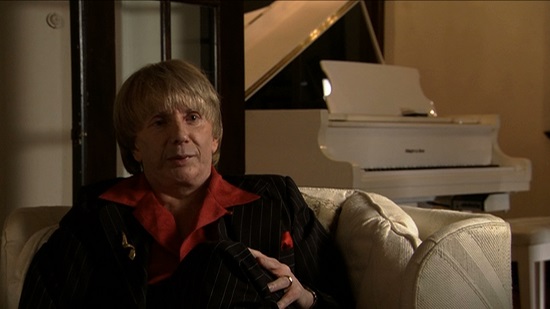
"Oh my God, I absolutely love this film, it’s just bombastic. I love his music, the layers of meaning in it are fascinating, but…him! The way that his songs are used to tell his story is really well done. It’s bold to the point of pretentious. There’s something about the music he made that made him very special, but my empathy and sympathy for him throughout the film really waivers, because I am in awe of his talent but am reviled by his ego, it’s really unappealing and horrible."
American Movie (Chris Smith, 1999)
"I just think it’s one of the best documentaries ever made. Brilliant characters, told with heart and empathy. It’s about filmmaking, but it just takes you into a world, and makes me really like the people in it and care about their struggles. The ultimate underdog film."
On Friday, September 6, Jeanie Finlay will be joined by Billy Boyd and Gavin Bain, who’ll be giving a one-off performance as Silibil N’ Brains at Dundee Contemporary Arts, followed by all three taking part in a Q&A on Saturday at the Glasgow Film Theatre. Londoners should head to Rough Trade East next Friday, September 13, for a free showing of the film and Finlay in conversation with the Quietus editor John Doran.

